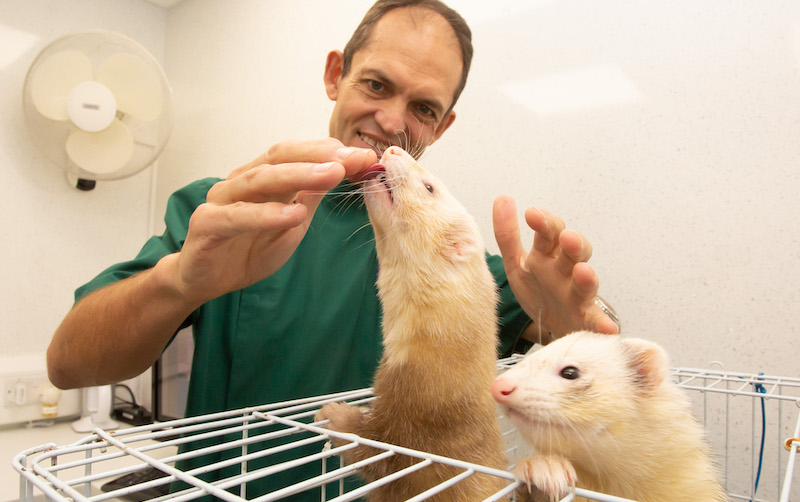
Although the obvious reason for neutering your ferret is to prevent unwanted litters of baby ferrets, there are other medical benefits listed below.
Why is neutering important for female ferrets?
Female ferrets (jills) will start to come into heat from March-September, the ferret breeding season. If a female ferret is not mated or spayed they can develop anaemia, which can be fatal. This is because when a female is in heat the body produces oestrogen; this reduces the production of red blood cells leading to anaemia.
Neutering can also reduce the pungent odour that ferrets emit. Spaying will also prevent uterine infection (pyometra) which can be fatal.
What’s involved in a female ferret spay?
The ovaries and uterus are surgically removed via an incision in the abdomen. Procedures are performed under general anaesthetic and patients are monitored carefully by vets and nurses throughout the procedure and recovery.
When can I have my ferret spayed?
We recommend ferrets are spayed from 6 months of age and before their first breeding season.
What are the options for neutering a male ferret?
Male ferrets (hobs) can either be castrated, which involves the surgical removal of the testicles or vasectomised whereby a small piece of the tube that carries sperm from each testicle to the urethra is removed and the remaining ends tied off, making the ferret infertile. If you have an entire female ferret which you do not wish to have spayed and do not wish to breed from then it will be necessary to mate her with a vasectomised male ferret when she comes in heat.
When can I have my ferret castrated or vasectomised?
From 5 months of age and ideally in the breeding season for male ferret (January to September).
How long will the procedure take?
Surgery is normally carried out in the morning and they are usually discharged in the early afternoon.
Are there non-surgical options for neutering ferrets?
Ferrets can be given a hormonal implant which for female ferrets will stop them coming into heat and will make male ferrets infertile 18 months. This needs to be implanted whilst under sedation.
Which option is best for my ferret?
The surgical neutering option has some pros; it prevents certain cancers of the reproductive organs and uterine infections in jills. This option also has one single cost and is a permanent solution. However, surgical neutering increases the chance of a ferret developing adrenal gland disease (hyperadrenocortism). This disease is caused by excessive production of sex steroids and leads to hair loss, weight loss, vulval swelling in jills and hyper sexual aggression. The disease can be managed with medication and in some cases the clinical signs may just be cosmetic.
Hormonal implants do not carry this risk but have an associated regular cost and are only temporary solutions. Both surgical and hormonal treatments will likely reduce the smell given off by ferrets and both are viable neutering option; speak to your vet about which is best for your pet.
Call us on 01435 864422 to book an appointment today.

